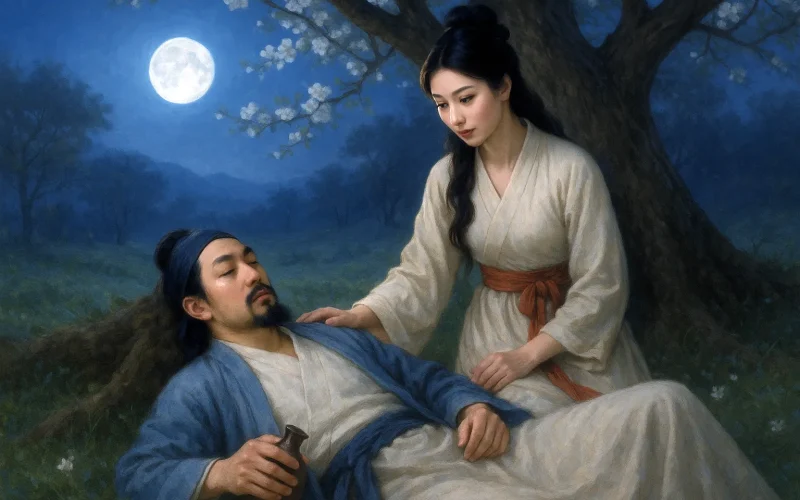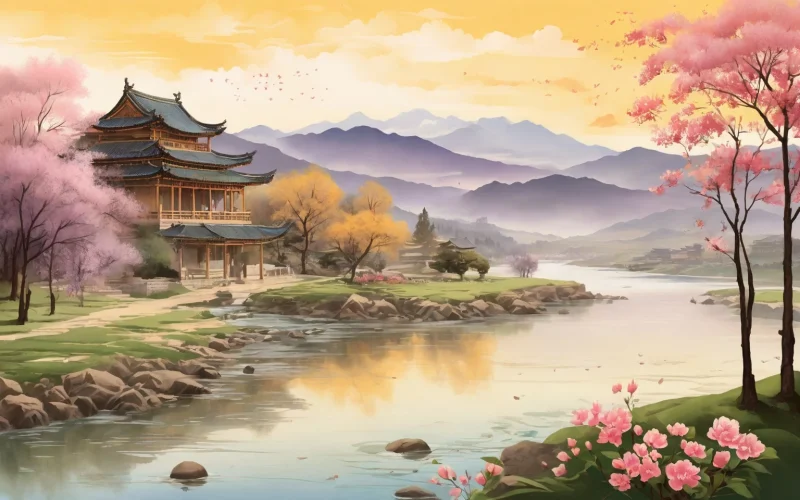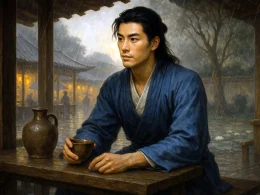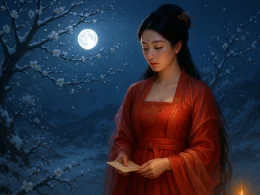The spring court at dawn doth a special scene display,
Where clear dewdrops on winding flowers lay.
A bumblebee, once passing, turns so lazy and deep,
That on fragrant stamens it nightly falls asleep.
Original Poem
「春晓」
陆龟蒙
春庭晓景别,清露花逦迤。
黄蜂一过慵,夜夜栖香蕊。
Interpretation
Lu Guimeng lived in the rural Jiangnan region during the late Tang Dynasty. Long withdrawn from public life, he farmed for sustenance, which honed his keen observation of nature’s subtle changes. His lyrical and pastoral poems often begin with ordinary scenes and daily life, yet evoke a world brimming with vitality. This "Spring Dawn" differs entirely from Meng Haoran’s famous poem of the same title—while the latter often carries a sense of spring nights fading and time slipping away, Lu’s piece purely depicts scenery, full of leisurely charm, reflecting his serene heart in close communion with nature.
First Couplet: "春庭晓景别,清露花逦迤。"
Chūn tíng xiǎo jǐng bié, qīng lù huā lǐyí.
The spring courtyard at dawn holds unique sights;
Clear dew graces winding, continuous flowers.
This couplet captures the stillness of spring dawn. The word "unique" (别 bié) highlights the scene’s special and delightful quality; "winding, continuous" (逦迤 lǐyí) depicts the flowers’ twisting, interlinked patterns and rich colors, creating a flowing visual effect. Dewdrops adorn connected blossoms, presenting a fresh and exquisite morning scene.
Second Couplet: "黄蜂一过慵,夜夜栖香蕊。"
Huáng fēng yī guò yōng, yè yè qī xiāng ruǐ.
A yellow bee passes, turns languid,
Night after night settling on fragrant stamens.
The latter couplet shifts to dynamic scenery. The poet personifies the bee, writing that it grows "languid" (慵 yōng) from the flowers’ scent, resting nightly among the blossoms—showing the spring flowers’ rich allure and, through the bee’s laziness, reflecting the season’s relaxed and leisurely atmosphere. This combines lifelike detail with personified charm.
Holistic Appreciation
This is a pure landscape poem, devoid of traditional spring sorrow or lament, instead revealing the fresh air and vibrant vitality of a spring morning courtyard. The first couplet describes glistening dew and lush flowers; the second portrays the bee’s idleness and repose—movement and stillness interplay delightfully. With extremely细腻 (xìnì, meticulous) observation, the poet captures life’s details, rendering a common scene poetic and picturesque.
The poem’s tone is bright and cheerful, making readers feel as if they are in a spring courtyard, smelling the fragrance and seeing bees lazily alight. Without complex allusions, it wins through genuine feeling, embodying Lu Guimeng’s simple and natural style.
Artistic Merits
- Ordinary subjects, beauty in commonality: The poet starts with small scenes of courtyard flowers and bees, transforming the mundane into the vivid, showcasing his skill in capturing subtle scenic beauty.
- Dynamic-static interplay, mutual enhancement: The first two lines depict stillness—flowers and dew reflecting each other, fresh and delicate; the latter two show movement—bees languidly alighting, enlivening the scene. Together, they form a complete vignette.
- Personification, full of charm: "A yellow bee passes, turns languid" is the poem’s inspired touch, giving the bee human traits, as if intoxicated by the spring flowers’ scent, adding humor and a leisurely feel.
- Simple language, rich painterly quality: The diction is light and natural yet highly visual and olfactory—e.g., "winding, continuous" (逦迤), "languid" (慵), "fragrant stamens" (香蕊)—reading like a small spring bird-and-flower painting.
- Light emotion, leisurely tone: Unlike traditional spring lament poems, it uses a relaxed brush to depict scenery, conveying the poet’s intimacy with nature and enjoyment of spring’s ease.
Insights
Poetry does not always require intense emotion or grand scenes; infinite poetry resides in life’s minor details. By observing dew-on-blossoms and bees in a spring courtyard, Lu Guimeng creates a light and leisurely mood, imparting the wisdom of embracing nature and living in the moment. Today, it still reminds us to notice everyday scenes and find poetry and joy in the ordinary.
About the poet

Lu Guimeng (陆龟蒙 ?– c. 881 CE), a native of Suzhou, Jiangsu, was a Late Tang dynasty writer and agronomist. After failing the imperial examinations, he retreated to a reclusive life in Puli, Songjiang. He formed a famous literary partnership with the poet Pi Rixiu, and the pair are often referred to collectively as "Pi-Lu." His poetry is known for its social satire and a style that is incisive yet subtly restrained. His inclusion in the Biographies of Talents of the Tangunderscores his significance. The modern writer Lu Xun famously praised his essays, noting that they provided "a sharp radiance piercing through a world of muddle". Lu Guimeng is regarded as a uniquely distinctive voice in the literary scene of the late Tang.












